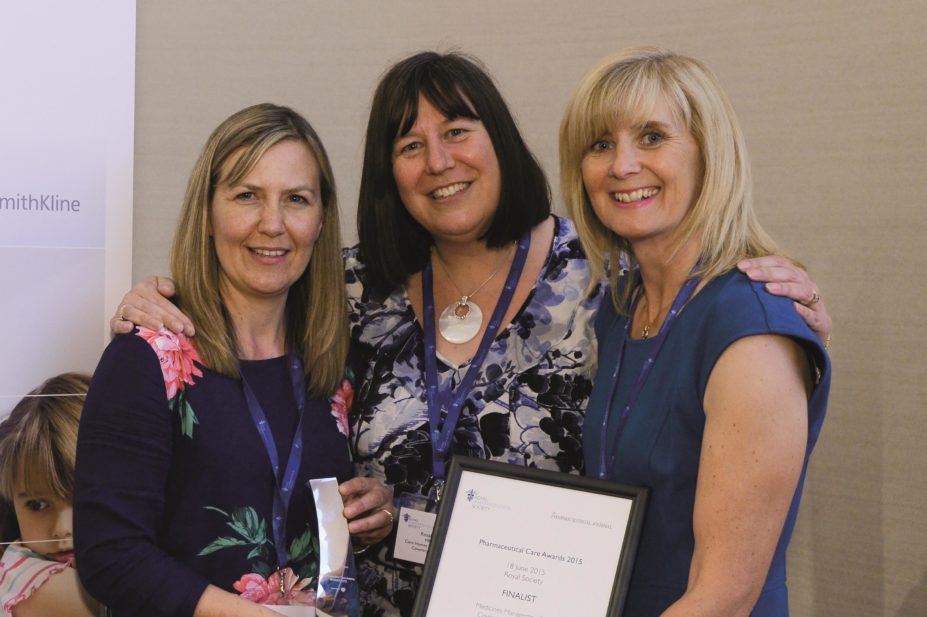
Simon Wright / The Pharmaceutical Journal
A pharmacist-led project that used dedicated medication reviews to reduce the burden of polypharmacy on older patients has scooped the Pharmaceutical Care Award 2015 at a ceremony in London.
The team from Coventry and Rugby Clinical Commissioning Group (CCG) found that, when supported by medicines management pharmacists, GPs could safely discontinue an average of 20% of medicines taken by elderly patients on eight or more medicines. This was twice the proportion GPs managed alone.
The entry was one of six finalists at the Pharmaceutical Care Awards 2015, held at the Royal Society in London on 18 June 2015.
A project to improve the detection of blood borne viruses by community pharmacies on the Isle of Wight won the Audience Choice Award, after it was voted by attendees as the most reproducible project.
The awards, now in their 23rd year, aim to recognise innovation and good practice in pharmaceutical care. They are jointly organised by The Pharmaceutical Journal and the Royal Pharmaceutical Society (RPS) and are supported by GlaxoSmithKline.
Judging the awards were Rose Marie Parr, recently appointed chief pharmaceutical officer for Scotland, Matthew Shaw, assistant director at the Centre for Pharmacy Postgraduate Education, and Christine Ward, chief pharmacist at London South West Healthcare NHS Trust. They were joined on the judging panel on the night by Catherine Duggan, RPS director of professional development and support.
At the event, two members from each of the six shortlisted teams were interviewed on stage about their projects by Matthew Wright, executive editor of The Pharmaceutical Journal, in a question and answer format, followed by questions from the judges and the audience.
Introducing the event, RPS president Ash Soni said the standard of the 30 entries received this year had been “incredible” and praised all six finalists.
“The care awards celebrate the achievements of individuals and teams from across [the UK], and recognise innovative practice and service development to benefit the health of patients,” he said. “I personally congratulate the six teams who have been shortlisted as finalists this year, as all the entries we received were of exceptional quality.”
Wright, who hosted the awards, said: “One thing the finalists tend to have in common is their willingness to adapt to changes in the health service, to drive forward positive change themselves to improve the care of their patients.”
The other four shortlisted projects included a medicines reconciliation scheme in North Bristol NHS Trust, which ensured over 95% of admitted patients received medicines reconciliation within 24 hours across 30 wards. It soon became the best performing acute trust in England and Wales against this target.
A project by pharmacists at London North West Healthcare NHS Trust devised a bespoke risk stratification tool which a pharmacist-led team used to assess medicines safety in care homes in Harrow, North West London. This reduced avoidable hospital admissions and demonstrated a net saving to the NHS.
In another finalist entry, specialist pharmacists at St George’s University Hospitals NHS Foundation Trust assessed diabetes patients before surgery to reduce the risk of complications. This included optimising poor glycaemic control and adjusting care plans where necessary, including follow-up communication with GPs on any issues identified.
A pharmacist-led nursing home outreach programme in Northern Ireland improved patient safety among residents with chronic conditions by reviewing the appropriateness of prescribing. Following the interventions in 16 nursing homes, average monthly accident and emergency admissions fell by around half.
The audience also heard from Carmel Darcy, consultant pharmacist for older people. Her team won the care award in 2014 for designing a consultant pharmacist-led care pathway for older people discharged from an acute hospital into intermediate care in Northern Ireland.
In the project, a consultant pharmacist assumes responsibility for a patient’s pharmaceutical care on admission until at least 30 days after discharge. Patients receive a structured medicines review to determine the appropriateness of their medicines, and they are issued with a care plan. Direct case management continues post-discharge, as the consultant pharmacist liaises with GPs and community pharmacists.
Darcy told the event that the project has now been endorsed by the Department of Health, Social Services and Public Safety, which will provide additional funding to roll out the model further within Northern Ireland. “Results from this [will] then form a business case and strategy for medicines optimisation for older people across the province,” she said.
Following the awarding of the trophies, Soni said he “implored” all finalists to share their projects outside the pharmacy profession. “Let’s go and show the rest of healthcare what fantastic jobs pharmacists do.”

